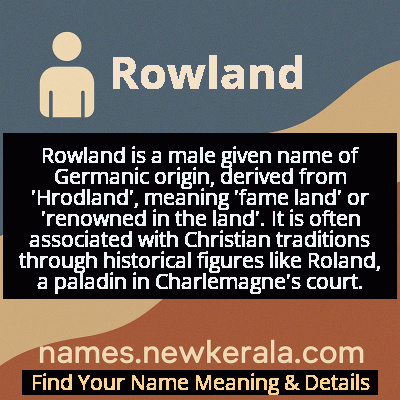Rowland Name Meaning & Details
Origin, Popularity, Numerology Analysis & Name Meaning of Rowland
Discover the origin, meaning, and cultural significance of the name ROWLAND. Delve into its historical roots and explore the lasting impact it has had on communities and traditions.
Name
Rowland
Gender
Male
Origin
Christian
Lucky Number
6
Meaning of the Name - Rowland
Rowland is a male given name of Germanic origin, derived from 'Hrodland', meaning 'fame land' or 'renowned in the land'. It is often associated with Christian traditions through historical figures like Roland, a paladin in Charlemagne's court.
Rowland - Complete Numerology Analysis
Your Numerology Number
Based on Pythagorean Numerology System
Ruling Planet
Venus
Positive Nature
Harmonious, responsible, caring, and artistic.
Negative Traits
Overly idealistic, superficial, possessive, or jealous.
Lucky Colours
Pink, turquoise.
Lucky Days
Friday.
Lucky Stones
Diamond, turquoise.
Harmony Numbers
2, 3, 9.
Best Suited Professions
Artists, musicians, teachers, healthcare workers.
What People Like About You
Warmth, nurturing nature, artistic flair.
Famous People Named Rowland
Rowland Hill
Postal Reformer
Revolutionized global postal systems with penny postage and adhesive stamps
Rowland H. Macy
Retail Entrepreneur
Founded Macy's department store chain and created modern retail practices
Rowland Evans
Journalist
Pioneered political television commentary with 'Evans and Novak' program
Rowland S. Howard
Musician
Influential alternative rock guitarist and songwriter
Name Variations & International Equivalents
Click on blue names to explore their detailed meanings. Gray names with will be available soon.
Cultural & Historical Significance
The name's popularity spread across Europe during the Middle Ages, particularly in England where it was adopted by Norman nobility. It appears in Shakespeare's 'As You Like It' as Orlando, demonstrating its literary prestige. In Christian tradition, Roland/Rowland represents the ideal of Christian knighthood - brave, loyal, and faithful. The name has been borne by saints, including Saint Roland of Parma, further cementing its religious significance. Throughout history, the name has maintained its association with leadership, bravery, and noble character across various European cultures.
Extended Personality Analysis
Individuals named Rowland are typically perceived as strong, reliable leaders with a natural authority and sense of responsibility. They often exhibit classic masculine virtues of courage, loyalty, and determination, reflecting the name's heroic origins. Rowlands tend to be practical problem-solvers who approach challenges with methodical precision and unwavering commitment. Their strong moral compass and sense of duty make them trustworthy companions and respected figures in their communities.
Beyond the surface strength, Rowlands often possess deep intellectual curiosity and creative talents. They balance their practical nature with artistic sensitivity, making them well-rounded individuals capable of both strategic thinking and emotional intelligence. While they may appear reserved initially, they develop deep, lasting relationships built on mutual respect and loyalty. Their combination of traditional values and modern adaptability allows them to navigate complex situations with grace and effectiveness. Many Rowlands demonstrate exceptional perseverance, seeing projects through to completion regardless of obstacles.
Modern Usage & Popularity
In contemporary times, Rowland maintains a distinguished presence as a classic but uncommon choice. While not among the top 1000 names in the United States currently, it enjoys steady usage among parents seeking traditional, strong names with historical depth. In the UK, Rowland ranks around position 800-900, showing consistent but modest popularity. The name appeals particularly to educated, middle-class families who value literary and historical connections. Modern Rowlands often go by nicknames like 'Rowley' or 'Rolly' in casual settings. The name's rarity in the 21st century gives it an exclusive, sophisticated quality while maintaining its timeless appeal. It's frequently chosen by parents with English or European heritage who want to honor family traditions without selecting an overly common name.
Symbolic & Spiritual Meanings
Symbolically, Rowland represents the archetype of the heroic protector and loyal companion. The name carries connotations of unwavering courage in the face of adversity, mirroring Roland's legendary stand at Roncevaux Pass where he refused to blow his horn for help until it was too late. This symbolizes the virtue of self-reliance and commitment to one's principles. The name also embodies the concept of 'noblesse oblige' - the idea that nobility extends beyond birthright to encompass moral responsibility and service to others.
Metaphorically, Rowland signifies the bridge between tradition and progress, representing individuals who honor heritage while embracing innovation. The name suggests a person who stands as a 'pillar' in their community - strong, reliable, and foundational. In psychological terms, it represents the integration of strength and sensitivity, power and compassion. The legendary Roland's oliphant (horn) symbolizes the importance of communication and the consequences of delayed action, adding layers of meaning about timing and expression to the name's symbolic repertoire.

